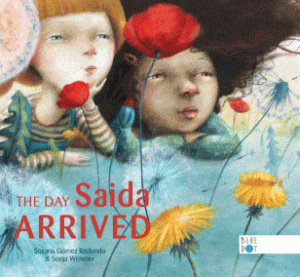
The Day Saida Arrived
The Day Saida Arrived
Susana Gômez Redondo
Sonja Wimmer
Blue Dot, 2020
32pp., hbk. RRP$A27.99
9781733121255
The day Saida arrived at the school she seemed to have lost her words and instead of joy and laughter there were tears and sadness. Her new classmate hunted high and low for the words but could not find them so instead, she drew a heart in chalk and Saida drew a smile. The first breakthrough!
When her dad explains that Saida probably hasn’t lost her words, it was just that her words wouldn’t work in this country, the little girl sets out to teach Saida the new words she needs as well as learning Saida’s words. What follows is the beginning of a joyous, lifelong friendship that is so characteristic of our children when confronted with this sort of language problem. They work it out, find common ground, ignore boundaries and borders and learn together.
Having worked so often in schools where English is an additional language for so many, where students with no English at all come to get that first grounding before they go to their neighbourhood school, this story is a stunning portrayal of how kids get along regardless particularly when adults don’t intervene. The playground is such a cosmopolitan learning space and whether the language is Arabic like Saida’s or Tagalog or whatever, the children’s natural needs overcome barriers. Enriching friendships are formed and their words that every “shape, sound and size” just mingle naturally.
With illustrations that are as joyful as the concept and the text, this is the perfect story for this time of the year to help students understand that being in such an alien environment can be bewildering and confusing, that there will be times when they are in Saida’s shoes and their words won’t work, but there is always help and hope. Because the learning between the girls works both ways, the story values Saida’s Arabic as much as her new friend’s English so that Saida is an equal partner in the story, offering a subtle nudge for us to consider how equally we treat our NESB students. What accommodations can and do we make for those whose words don’t work in our libraries and classrooms?
Teachers’ notes are available and while these are written for the US, they are readily adaptable to the Australian situation..